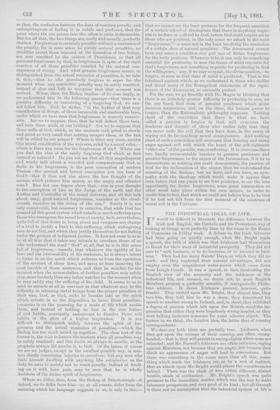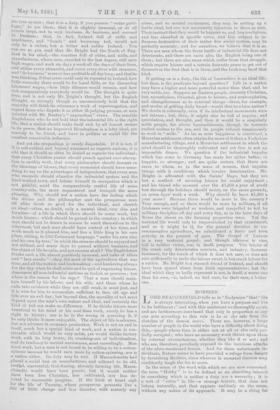THE INDUSTRIAL IDEAL OF LIFE.
IT would be difficult to illustrate the difference between the Irish and English, the Catholic and the Protestant, way of looking at things more perfectly than by the scene in the House of Commons on Friday week. A debate on the Irish labourer had been going on quietly enough, when Mr. Bright made
a speech, the drift of which was that Irishmen had themselves to thank for their want of industrial prosperity. They did not care to "seek business, or to do business, or to succeed iu busi- ness." They had too many Saints' Days, on which they did no work ; and they neglected their natural advantages, did not employ oven the magnificent water-power which came down from Lough Corrib. It was a speech, in fact, inculcating the English view of the necessity and the nobleness of the industrial life, and seemed, we doubt not, to most English Members present a perfectly sensible, if unexpectedly Philis- tine address. It drove L•ishmen present, however, quite frantic, They rushed upon Mr. Bright, they abused him, they tore him, they told him he was a sham, they denounced his speech as another wrong to Ireland, and, in short, they exhibited. a degree of passion which left upon the British mind the im- pression that either they wore hopelessly wrong-headed, or they wore talking insincere nonsense for some ulterior object. The former is, we think, the London idea, the latter that of country correspondents.
We dare say both ideas are partially true. Irishmen, when they get upon the wrongs of their country, are often wrong- headed ,—that is, they will persist in seeing slights where none are intended ; and Mr. Parnell's followers are often insincere, raging against Ministers, not because they are angry, but because they think an appearance of anger will lead to concessions. But there was something in the scene more than all this, some- thing which made the Irishmen see, as by a sort of instinct, that an attack upon Mr. Bright would please the constituencies behind. There was the clash of two widely different, almost hostile, ideals of civilisation. Mr. Bright's speech was quite germane to the immediate matter, which was the way to make labourers prosperous, and very good of its kind ; but all through it there ran an assumption that the industrial system of life is the true system ; that it is a duty, if you possess " water privi- leges," to use them; that it is slightly immoral, or at all events inept, not to seek business, do business, and succeed au business ; that, in fact, Ireland full of mills and machinery, and " hands " and humming toil, would not only be a richer, but a better and nobler Ireland. You can see as you read that Mr. Bright had the North of Eug- laud in his mind,—the counties full of cities, and mills, and manufactures, where men, crowded to the last degree, still earn high wages, and work six days a week all the days of their lives, and utilise every streamlet, and cover every river with steamers, and "do business " more or less profitable all day long; and that he was thinking, if that scene could only be repeated in Ireland, how little necessity there would be for Land Bills, or for discussing labourers' wages,—how little idleness would remain, and how .rich comparatively everybody would be. The thought is quite true, and is not only Mr..Bright's thought, but the English thought, so strongly though so unconsciously held that the majority will think its utterance a work of supererogation, and regard those who dispute it as either ill-judging persons, or men infected with Mr. Ruskin's " unpractical" views. The sensible Englishmen who do not hold that the industrial life is the right "life, that a nation should make itself rich by all honest means in its power, that a.0 improved Birmingham is a lofty ideal, are scarcely to be found, and have iu politics or social life the smallest conceivable influence.
And yet the propositign is surely disputable. If it is not, if it is self-evident and beyond argument as regards nations, it is -odd that it should so often be denied as regards the individual ; that every Christian pastor should preach against over-absorp- .tion in earthly work, that every philosopher should descant on the blessings of leisure, that every economist should have some- thing to say on the advantages of independence, that every man who succeeds should abandon the industrial system and the hard-worked town, and betake himself to occupation which is 'not gainful, amid the comparatively restful life of some country-side, the more sequestered and tranquil the more pleasing. Why should not a nation have the feeling which the divine and the philosopher and the prosperous man all alike think so good for the individual, and cherish ..uu ideal—often, no doubt, only a mental ideal, very dim and 'formless—of a life in which there should be some work, but much leisure ; which should be passed in the country ; in which men should not be drawn in masses to exert themselves to the .uttermost, bat each man should have control of his time, and work much as it pleased him, and live a little king in his own ,place, sitting, in Old-Testament language, "under his own vine and hie own fig-tree;" in which the streams should be enjoyed and not utilised, and many days be passed without business, and the object of life be calm, and not success at all ? The Englishman thinks such a life almost positively immoral, and talks of idlers and " lazy monks "—they did most of the agriculture that was done, and all the tuition and bookmaking —and hankering always for the day when he shall retire and be quit of engrossing labour, denounces all non-industrial nations as foolish or perverse ; but where is the reason for his rage ? That a man should main- tain himself by his labour, and his wife, and those whom he calls into existence while they are still weak, is most just, and it is wise for him to accumulate sufficient to face old age and tide over au evil day; but beyond that, the morality of toil must -depend upon the man's own nature and ideal, and certainly the kind of toil can make no difference. If he thinks leisure more beneficial to his mind or his soul than work, surely he has a 'right to leisure ; nor is he in the wrong in pursuing it, if he only thinks it.more enjoyable. The object of life is advance, but not advance in economic production. Work is not an end in itself, much less a special kind of work, and a nation is con- ceivable which would be very noble, yet would dislike factory work, with its long hours, its crashing-out of individualism, and its tendency to mental narrowness, most exceedingly. Man must work, but a man is not bound to be willing to be a cotton- spinner because he would earn more by cotton-spinning, nor is a nation either. Its duty may be rest. If Massachusetts had ,placed a social ban on manufactures, and adhered to its old, 'rattail, uneventful, God-fearing, slovenly farming life, Massa- chusetts would have been poorer, but it would neither have been less Christian, less cultivated, nor less de- voted to reasouable progress. If the Irish at heart sigh for the life of Tuscany, where prosperous peasants live a +life of little change and less disorder, with scarcely any
crime, and no mental excitement, they may be setting up a feeble ideal, but one not necessarily injurious to them as men. Their instinct that they would be happier so, and less irreligious, and less absorbed in ignoble cares, and less subject to in- fluences destructive of their rather fine social system, may be perfectly accurate ; and for ourselves, we believe that it is so. There are men whom the fierce battle of industrial life does not deteriorate, and there are races also, the English being one of them ; but there are also races which 'suffer from that struggle, which require leisure and a certain domestic peace to get out of themselves the best that is in them, and the Irish may be.of that kind.
If getting on is a duty, the life of Lancashire is an ideal life; but then, is the predicate beyond question ? Life iu a nation may have a higher and more powerful motor than that, and be very noble, too. Suppose an Eastern people, sincerely Christian, but, nevertheless, Oriental, given to leisure, and contemplation, and changelessness as to external things—dress, for example, and modes of getting daily bread—would that be abase nation ? We doubt it extremely, even if its intellectual movements were not intense ; but, then, it might also be full of inquiry, and speculation, and thought, and then it would be a singularly noble people, far above Laucashiremen, though its torrents rushed useless to the sea, and its people refused unanimously to work in " mills." As far as mere happiness is concerned, a Moravian settlement often attains far more of it than a Yorkshire manufacturing village, and a Moravian settlement in which the mind should be thoroughly cultivated and set free is not an impossible dream. We question if the industrial impulse which has come to Germany has made her either better, or happier, or stronger ; and are quite certain that there are races to whom, as to the mass of women, that impulse brings with it conditions which involve deterioration. Mr. Bright is affronted with the Saints' Days, but they are but a method of securing leisure for social enjoyment ; and his friend who moaned over the £1,200 a year of profit lost through the holidays should insist, on the same grounds, on seven days' work a week. Why should lie have £1,200 a year more ? Because there would be more in the country P True enough, and so there would be more by millions, if all Irishmen were brigaded as workers, and compelled to toil by military discipline all day and every day, as in the later days of Rome the slaves on the farming properties were. Yet the national life would only be impoverished by that experiment, and so it might be if, for the general devotion to un- remunerative agriculture, we substituted a fierce and keen activity in the pursuit of gain. The Gospel of Labour is a very material gospel; and though idleness is vice, toil is neither virtue, nor, in itself, progress. The labour of the crank only deteriorates convicts, and industry, however incessant, for the result of which it does not care, or does not care sufficiently to make the labour sweet, is but crank labour for a nation. Mr. Bright is a staunch friend of Ireland, and should have been spared abuse from Irish representatives ; but the ideal which they so badly represent is not, in itself, a worse one than his own,—is, indeed, we feel sure, for their race, a batter one.







































 Previous page
Previous page